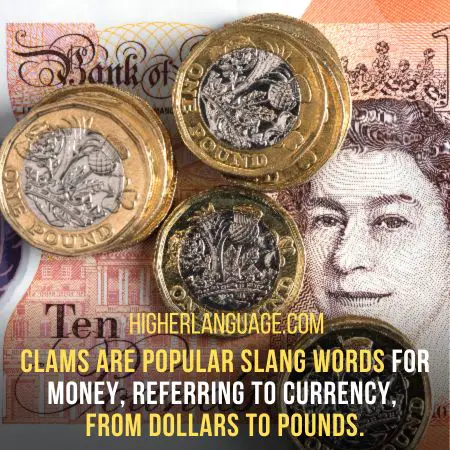Different countries use different slang words for money. These words refer to different types of money and savings.
[toc]
This article covers the common slang words for money. These are some of the common words associated with money.
Slang Words For Money
Money talks and has its own unique set of slang words too. Knowing some common slang words for money can help you sound like a true financial whiz.
Here are some of the most popular slang words for money:
1. Dough:
This term is one of the most widely used to refer to money in casual conversation. It’s often used in phrases such as “I need to make some dough.”
The dough might be an old-fashioned slang word for money. It’s still used in casual conversations today. It’s a great way to discuss your finances without getting too technical.

Whether you’re trying to save extra dough, this term makes talking about money more interesting.
So the next time you hear someone say they need some dough, know they’re referring to their bank account.
2. Cheddar:
This term comes from the fact that cheddar cheese was once a form of currency. Now it simply refers to any cash. Cheddar is one of the most popular slang words for money.
It’s a term that has been used worldwide since at least the 1950s and continues to be used by people of all ages today. The exact origin of the term is unknown.
It’s thought to have come from two sources: British sailors’ use of “cheddar cheese” as a metaphor for wealth. Its also rap music in the 1980s, which helped spread its usage.
Cheddar can refer to any amount of money, ranging from pocket change to serious amounts of cash.
3. Bread:
Bread is another classic phrase for money. “bread” usually refers to paper money or cash. Different regions of the world also have unique slang terms for money.
For example, “moolah” is a popular term for money in Australia. Whatever word you use to talk about your finances, one thing is certain. It’s important to be wise with your dough.
So remember the slang words for money and keep an eye on your bank balance. That way, you’ll always have plenty of bread in the bank.
4. Moolah:
This term is derived from the Hindi word for “money”. It has been used in the English language since at least the mid-1900s.
Moolah is one of the many slang words for money. It can refer to any currency, from coins and banknotes to digital funds. This term has been around since the 1920s.
It became popularized in the 1960s when it was frequently used in American blues music. There are various slang words for songs and music as well.
It has since become a catch-all term for any money. Sometimes it is specifically used to refer to large sums of cash.
5. Benjamins:
Slang for $100 bills due to Benjamin Franklin’s picture being printed on them. Benjamins are one of the most popular slang words for money.
They have become widely used among both young and old people. The term comes from the portrait of Benjamin Franklin on the US $100 bill.
The bills are often called “Benjamins” or “Franklins”. It is due to their resemblance to Benjamin Franklin.
It’s a great way to refer to cash while keeping it casual and showing off your American history knowledge.
So next time you need cash, remember that Benjamins are always there.
6. Scratch:
These days, you might hear people referring to their money as “scratch.” That’s because “scratch” is one of the slang words for money that has been popularized in recent years.
This term can be used to refer to any small change. This term refers to cash and can also be used generally when discussing money and finances.
If someone says they are “scratching together” some money, they are saving or trying to get it together for a specific purpose.
It’s another way of describing financial responsibility.
7. Brick:
This is an interesting one. Brick has become a popular slang word for money in certain circles. It originates from the phrase ‘brick of cash’.
It refers to large amounts of paper money stacked like bricks. Many people have adopted the term.
Particularly in urban areas, as a way to refer to money without using the original words. It can be used when talking about someone’s wealth or financial status.
Whatever the origin of this slang word may be, it has found its place in today’s culture and language.
8. Clams:
Clams are one of the most popular slang words for money out there. It refers to any currency, from dollars and cents to pounds and pence.
The term comes from exchanging money for various items. It is like clams that can be bought at a market or restaurant.
If you hear someone talking about saving up their clams, they’re talking about saving up money.
Clams are also used to talk about an amount of money without sounding quite specific.
So instead of saying, “I spent fifty dollars,” someone might say, “I spent fifty clams.” Whatever you call it, having extra clams in your pocket is always welcome.
9. Coin:
The way we talk about money has changed a lot over the years. We no longer use terms like “shillings” or “dollars” but instead rely on slang words for money.

These words include “coin”, “bread”, and even “moolah”. The coin is one of the most popular slang words for money, dating back to the mid-19th century.
It comes from the idea that coins are a physical representation of wealth like pieces of bread once were.
Whatever its origin, the coin is now an integral part of our language when discussing money.
10. Dinero:
Slang words for money, like dinero, have existed since the 16th century. But these days it’s more popular than ever.
Whether considering saving up for a big purchase, having some extra dinero is always a plus.
From investing in stocks to planning a fun weekend getaway, there are plenty of ways to put your dinero to good use.
Don’t let it sit idle. Make it work for you. With the right plan and mindset, you’ll be able to get the most out of your money.
11. Stash:
Slang words for money can be useful when we want to talk about it without being too explicit.
Stash is one of those slang words for money, often used when talking about large amounts of cash or wealth.
It’s a great way to refer to money in casual conversation. Instead of saying, “I have a lot of money,” you could say, “I’ve got a nice stash.”
With its playful connotations, this word can also be used sarcastically or humorously.
Remember, when referring to your finances, don’t forget the power behind the word ‘stash’.
12. Making Bank:
Making bank is one of those slang phrases that never goes out of style. Whether you’re talking about making a few bucks or a million, it’s an expression.
It captures the feeling of achieving financial success. It describes someone who has achieved greatness in business, especially when earning money.
“Making bank” might be the perfect way to describe someone who has made it big in finance.
When someone tells you they’re making bank, feel free to ask for details. Everyone loves bragging about their successes.
13. Payola:
Payola is one of the oldest slang words for money. It’s been around since the 1950s. It is still used today to refer to exchanging money in return for a favor or benefit.
Payola can involve anything from cash payments to gifts or other forms of compensation.
It involves unscrupulous business deals done without legal repercussions for either party involved.
Payola scandals have dominated headlines, with some notable cases involving high-profile figures.
If you hear someone talking about payola, it’s associated with unethical behavior.
14. Loot:
Loot is a slang term for money. It’s used when talking about someone receiving a financial reward or advantage from something.
For instance, people might say, “I made some good loot off that investment”. In this context, the word loot can imply that the benefit maybe even undeserved.
It’s also sometimes used to describe money received through less-than-honorable means.
If someone brags about getting a lot of loot in a shady deal, it implies that they got an unfair advantage. This usage has its roots in pirate culture.
In this culture where plundering ships was seen as justifiable robbery. Though today it carries more negative connotations than positive ones.
15. Hundie:
Hundie is a slang word for money that has been around for decades.
It likely originated from the “C-note” nickname of the $100 bill and can be used for any cash.
It’s often used by people talking about large amounts of money. It also gets tossed around casually when referring to smaller amounts.
Regardless of how much cash is being discussed, the term ‘hundie’ can be useful.
16. Dub:
When it comes to slang words for money, one of the most commonly used is “dub”. This term has been around since at least the late 1800s.
It often refers to a large sum of money or a cash windfall. It can also mean something valuable, such as expensive jewelry or a luxury car.
Although there isn’t an exact origin known for this word, it is believed that it originated from Dublon coins.
They were popular among travelers in the 19th century.
So think dub if you need to reference cash or something valuable. You’ll be all set with this classic slang word.
17. Cold Hard Cash:
When it comes to money, there’s no better phrase than “cold hard cash”. It’s one of the most popular slang terms for money out there.
People can refer to it from street corners to boardrooms as a currency.
It may not be official legal tender, but don’t let that stop you from using this widely accepted term.
If you’re talking about getting paid, cold hard cash remains an easy way to describe funds.
And since its usage is so widespread, any areas where cash still plays a major role are likely to understand what you mean when you mention “cold hard cash.
18. Bucks:
Bucks are slang for money, which you may have heard in conversations.
Someone might say, “I need to make some bucks,” or “Let’s pool our bucks together.” It’s a casual way of saying money without sounding too formal.

Bucks can refer to any currency. Whether you’re talking about dollars, euros, or yen, it still counts as making bucks.
In today’s world, having extra bucks on hand comes in handy.
Even if you don’t have a lot of coins in your pocket, there are plenty of ways to save up and make some extra bucks.
Conclusion:
Slang terms for money have been around for centuries. Different countries and cultures have their unique slang.
No matter the country or culture, one thing is certain: everyone needs money to survive.
Some of the most common slang words for money include “bread”, “clams,” “moolah,” and “greenbacks.”
In the United States, people refer to money as “bucks” or “dollars”. In the UK, money is sometimes called “pounds” or simply “cash.”
Other slang words are more humorous, like calling money “the stuff that dreams are made of” or “the root of all evil.”
Whatever you call it, having money on hand makes things much easier.
So next time you talk about money with your friends, try using some slang words for money.
Have fun with it, and use different slang words for money occasionally.